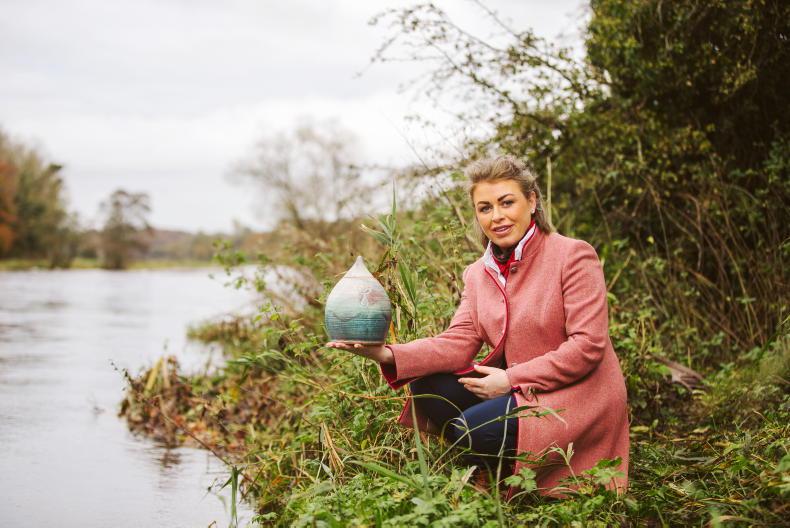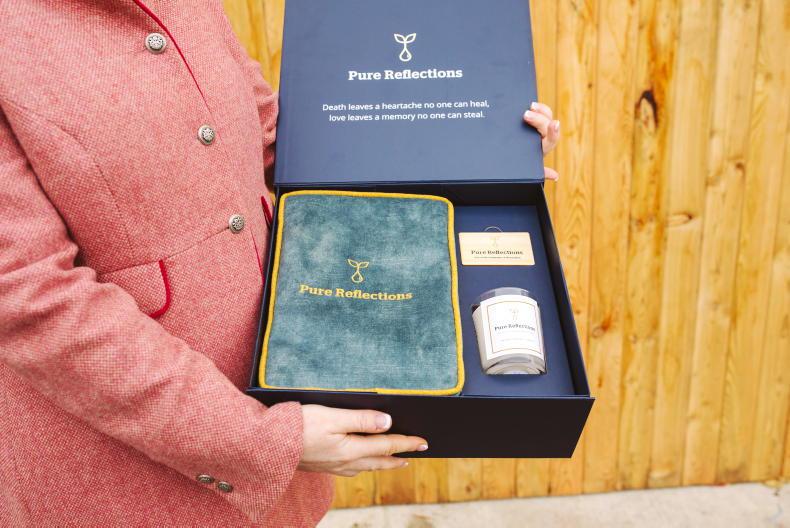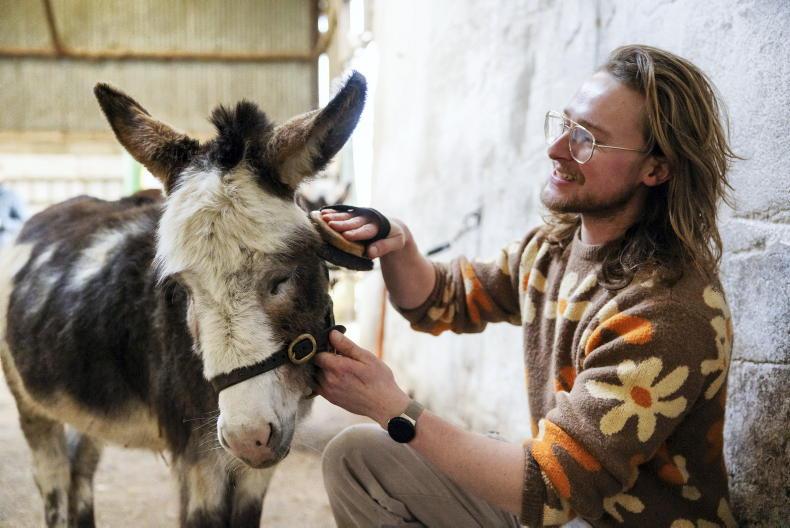For Elizabeth Oakes, embarking on a career in the funeral industry at just 17 was almost accidental.
“The careers guidance teacher gave us a FÁS disc and I remember going through each job on it and it was to see what was the shortest amount of time in education where you got a good salary after,” she explains, matter of fact.
“And this thing just came up and it said ‘embalmer’... I didn’t know even how to pronounce it and I was like, ‘Mam, I’m going to be an embalmer!’”
Fast-forward 20 or so years later, however, and Elizabeth is about to launch the first water-based cremation service in Ireland – and indeed, the EU – in January. What started as a means to an end has become a true vocation; and one she has never taken for granted.
“That responsibility of looking after someone in their last moments on this earth, it’s an honour; it’s an absolute honour to be that person,” she says. “It’s like a midwife bringing a baby into this life. I’m like the other end of it.”
Born entrepreneur
For somebody who works in the business of death, Elizabeth positively bubbles with life. Apart from her cremation startup, she runs two successful permanent makeup clinics, rears Connemara ponies on her small-holding; and is a mother of five children under six.
But then, she knows better than most that “we only have this one life”. “My one thing is that I would hate to die with regret,” she says. “I’d rather have tried and failed a million times rather than say, ‘Oh I wish I had done this’ or ‘I wish I had done that.’”
Elizabeth attributes that outlook to her upbringing on a small farm in Johnstown, Co Meath. Her mother, Clare, is a saddler and from a young age, Elizabeth showed similar entrepreneurial spirit, explaining how she started her first business after she found £20 in a dustbin in Dublin.
“On the way home, I bought two rabbits. Two rabbits became 36 rabbits and I got guinea pigs as well, a male and a female, and at the height of it, I had 36 rabbits and 18 guinea pigs and I used to then supply the pet shops; but I was only eight years old!” she recalls.
In a similar vein, she bought, trained and sold on her first pony with her confirmation money, and in secondary school, established a tuck shop run where she would take orders from her classmates at break time; for a small handling fee.

Elizabeth Oakes who has a water based Cremation business called Pure reflections. www.purereflections.ie \ Claire Nash
“I’d made a deal with the nun in the tuck shop that I wouldn’t have to stand in the queue,” she explains. “But it was just like that: spotting a niche in the market and going for it.”
Despite her innate entrepreneurship, however, Elizabeth struggled with the more traditional academics of school, which is why she was drawn to an apprenticeship, training initially with David McGowan, who operates funeral homes in Mayo and Sligo and was the subject of the award-winning documentary, The Funeral Director.
“I used to drive the hearse, dug graves, directed traffic, did the embalming,” lists Elizabeth when Irish Country Living asks what exactly the training involved.
How did other people her age react when she told them what she was studying?
“When I’d say ‘I’m an embalmer’, they used to think I’d said, ‘I’m a barmaid,’” she laughs.
But how did she cope with the more challenging aspects of that work, at such a young age?
“I suppose if you can separate life from death, you realise you’re just doing something that’s good,” responds Elizabeth thoughtfully.
“I don’t know if I’m right or wrong, but I believe the spirit leaves the body and this is only the vessel that we’re carried around in, and I just have to make this vessel look good for the family so that they get their last goodbye and that it’s a good experience and it starts a healthy grieving process.”
Training in America
Elizabeth credits David for being “very open minded and very progressive” for encouraging her teenage self in the industry, which can be hard to break into without having a family connection.
Indeed, he urged her to go to the US to complete a degree in mortuary science, where Elizabeth studied everything from chemistry and anatomy to restorative art (the skill of face reconstruction for an open coffin, for instance, if somebody dies in a car accident) and even the maritime laws around burial at sea.
It was also in America that Elizabeth first came across the idea of water cremation, known as resomation or alkaline hydrolysis. In this process, the body is placed in what looks like an MRI machine, and is washed in a solution of 95% water and 5% alkaline, which reduces it gradually to its natural chemical components of amino acids, peptides, sugars and salts, leaving behind pure calcium phosphate (bone). The liquid is treated and disposed of, with the bones placed in a machine called a cremulator to be reduced to ash, which is what would traditionally be placed in an urn after flame cremation.
The practice has seen increased popularity in the US and Canada; although the Catholic Church in the United States does not currently approve of how the chemical remnants of the body are disposed of (through the waste water system after treatment) as it does not see this as respectful of the dignity of the human body, according to their teachings.
(This is much the same reason for the Vatican ruling that ashes from traditional cremations should not be kept at home or scattered, but buried in sacred ground.)
Others argue, however, that it is simply a speeded-up version of what happens naturally when a body is buried, that it is affordable as it negates the need for a coffin or a burial plot, or they feel that it is a greener-alternative to traditional flame cremation; a report in the Smithsonian magazine in 2022 stated that it used 10% of the energy required for a flame cremation. Earlier this year, the practice received a lot of attention globally after it was reported that the anti-apartheid campaigner, Archbishop Desmond Tutu, requested a water cremation. To the young Elizabeth all those years ago, however, it simply seemed like a more gentle alternative.
“After seeing flame cremation and after seeing water cremation, I knew there was something in that,” says Elizabeth.
On her return to Ireland, however, she found that it was hard to get a foothold in the funeral industry in her own right.
“I just feel that when I was 21 and a female, back then, the industry just wasn’t ready for my ideas. And I just felt I wasn’t taken seriously,” she says.
“I think they thought I was a child. So I just thought, ‘I’m going to park this.’”

Elizabeth Oakes provides a range of services through Pure Reflections. \ Claire Nash
Leading the way
While in the States, Elizabeth had been introduced to the concept of permanent make-up (the process of cosmetic tattooing of eyebrows, eyeliner etc, often used for people who have lost hair through cancer treatment or a condition like alopecia).
Eager to learn more, she volunteered in a local clinic, where she was trained up in lieu of payment and on her return to Ireland, started to do permanent make-up part-time. Before she knew it, she was running clinics in 180 salons across Ireland; though today she concentrates on running two of her own studios in Dublin and Cork.
That said, Elizabeth always kept up to speed on developments in the funeral industry. About five years ago, she was at a conference when an American speaker spoke about how water cremation was gaining traction in the US and Canada.
“Now, there was 70 other people in that room; but nobody heard it,” says Elizabeth. “That night I went and I emailed the company that make the machine, they’re in England; and the following week I was over there.”
Elizabeth would go on to sign an exclusivity agreement to bring the technology to Ireland; but the journey to get to where she is today was not without its challenges. For instance, it took a year and a half of working with Irish Water to get the discharge license needed to be able to dispose of the steralised liquid from the resomation process.
However, she also received €200,000 LEADER funding for the project, which she estimates has cost €700,000 in total to date. In January, she hopes to finally launch Pure Reflections in Navan, where she is renting a space from an established funeral home that already had an embalming facility in place.
Elizabeth believes that the time is right as “the funeral industry hasn’t changed in over 150 years”. As well as the resomation process itself (which costs €1,200, and includes a biodegradable urn), Elizabeth also offers services such as a committal ceremony, as she is a trained celebrant, and aims to make the process as gentle, respectful and personal as possible.
To this end, she has a detailed form that people who wish to plan their own funeral can fill out, outlining everything from what they would like to wear to their choice of music or readings. So far, she has 20 people’s wishes on file; ranging from those diagnosed with a terminal condition, to others who simply want to state their preferences and plan.
Encouraging conversations
Whatever burial a person chooses, Elizabeth believes it’s important for families across Ireland to have more open conversations about what they want after they die.
“I’d see it or you’d hear it, where an elderly parent might be sick and they’d try and talk to the child and the child would say, ‘Don’t be talking like that!’ It’s better if we can let the people talk because it clears their mind, it gives them a clear picture of what they want and they feel much more comfortable about the situation then because it is inevitable; we’re not going to live forever,” she says.
“It takes so much of the guess work out of it… if you’re given a list of instructions and to carry out these, you feel good about it and you’re going to do what they have asked, it’s their dying wish. Whereas if there’s nothing, that’s when arguments and fighting and, ‘No, mam would have wanted to go here and she would have wanted to be cremated, no she wouldn’t, she would have wanted to be buried’. If it’s not spoken about, it can leave so many questions unanswered and a huge amount of responsibility put on whoever is left behind.”
As for Elizabeth’s wishes? She likes the idea of a “living funeral”, where she would have her own celebration while still alive.
“Invite everyone and tell my own story, have music playing that I wanted, have Irish dancers; I’d have one hell of a party,” she smiles. “Anything is possible these days if people have the help to step outside of the norm.”
And as for what she wants after that?
“I must write it down for my husband,” she laughs, “I’ll come back and haunt him otherwise!”
For more visit www.purereflections.ie
Read more
Meet the woman who has made death her life purpose
Shining a light for rural entrepreneurship at Solas
For Elizabeth Oakes, embarking on a career in the funeral industry at just 17 was almost accidental.
“The careers guidance teacher gave us a FÁS disc and I remember going through each job on it and it was to see what was the shortest amount of time in education where you got a good salary after,” she explains, matter of fact.
“And this thing just came up and it said ‘embalmer’... I didn’t know even how to pronounce it and I was like, ‘Mam, I’m going to be an embalmer!’”
Fast-forward 20 or so years later, however, and Elizabeth is about to launch the first water-based cremation service in Ireland – and indeed, the EU – in January. What started as a means to an end has become a true vocation; and one she has never taken for granted.
“That responsibility of looking after someone in their last moments on this earth, it’s an honour; it’s an absolute honour to be that person,” she says. “It’s like a midwife bringing a baby into this life. I’m like the other end of it.”
Born entrepreneur
For somebody who works in the business of death, Elizabeth positively bubbles with life. Apart from her cremation startup, she runs two successful permanent makeup clinics, rears Connemara ponies on her small-holding; and is a mother of five children under six.
But then, she knows better than most that “we only have this one life”. “My one thing is that I would hate to die with regret,” she says. “I’d rather have tried and failed a million times rather than say, ‘Oh I wish I had done this’ or ‘I wish I had done that.’”
Elizabeth attributes that outlook to her upbringing on a small farm in Johnstown, Co Meath. Her mother, Clare, is a saddler and from a young age, Elizabeth showed similar entrepreneurial spirit, explaining how she started her first business after she found £20 in a dustbin in Dublin.
“On the way home, I bought two rabbits. Two rabbits became 36 rabbits and I got guinea pigs as well, a male and a female, and at the height of it, I had 36 rabbits and 18 guinea pigs and I used to then supply the pet shops; but I was only eight years old!” she recalls.
In a similar vein, she bought, trained and sold on her first pony with her confirmation money, and in secondary school, established a tuck shop run where she would take orders from her classmates at break time; for a small handling fee.

Elizabeth Oakes who has a water based Cremation business called Pure reflections. www.purereflections.ie \ Claire Nash
“I’d made a deal with the nun in the tuck shop that I wouldn’t have to stand in the queue,” she explains. “But it was just like that: spotting a niche in the market and going for it.”
Despite her innate entrepreneurship, however, Elizabeth struggled with the more traditional academics of school, which is why she was drawn to an apprenticeship, training initially with David McGowan, who operates funeral homes in Mayo and Sligo and was the subject of the award-winning documentary, The Funeral Director.
“I used to drive the hearse, dug graves, directed traffic, did the embalming,” lists Elizabeth when Irish Country Living asks what exactly the training involved.
How did other people her age react when she told them what she was studying?
“When I’d say ‘I’m an embalmer’, they used to think I’d said, ‘I’m a barmaid,’” she laughs.
But how did she cope with the more challenging aspects of that work, at such a young age?
“I suppose if you can separate life from death, you realise you’re just doing something that’s good,” responds Elizabeth thoughtfully.
“I don’t know if I’m right or wrong, but I believe the spirit leaves the body and this is only the vessel that we’re carried around in, and I just have to make this vessel look good for the family so that they get their last goodbye and that it’s a good experience and it starts a healthy grieving process.”
Training in America
Elizabeth credits David for being “very open minded and very progressive” for encouraging her teenage self in the industry, which can be hard to break into without having a family connection.
Indeed, he urged her to go to the US to complete a degree in mortuary science, where Elizabeth studied everything from chemistry and anatomy to restorative art (the skill of face reconstruction for an open coffin, for instance, if somebody dies in a car accident) and even the maritime laws around burial at sea.
It was also in America that Elizabeth first came across the idea of water cremation, known as resomation or alkaline hydrolysis. In this process, the body is placed in what looks like an MRI machine, and is washed in a solution of 95% water and 5% alkaline, which reduces it gradually to its natural chemical components of amino acids, peptides, sugars and salts, leaving behind pure calcium phosphate (bone). The liquid is treated and disposed of, with the bones placed in a machine called a cremulator to be reduced to ash, which is what would traditionally be placed in an urn after flame cremation.
The practice has seen increased popularity in the US and Canada; although the Catholic Church in the United States does not currently approve of how the chemical remnants of the body are disposed of (through the waste water system after treatment) as it does not see this as respectful of the dignity of the human body, according to their teachings.
(This is much the same reason for the Vatican ruling that ashes from traditional cremations should not be kept at home or scattered, but buried in sacred ground.)
Others argue, however, that it is simply a speeded-up version of what happens naturally when a body is buried, that it is affordable as it negates the need for a coffin or a burial plot, or they feel that it is a greener-alternative to traditional flame cremation; a report in the Smithsonian magazine in 2022 stated that it used 10% of the energy required for a flame cremation. Earlier this year, the practice received a lot of attention globally after it was reported that the anti-apartheid campaigner, Archbishop Desmond Tutu, requested a water cremation. To the young Elizabeth all those years ago, however, it simply seemed like a more gentle alternative.
“After seeing flame cremation and after seeing water cremation, I knew there was something in that,” says Elizabeth.
On her return to Ireland, however, she found that it was hard to get a foothold in the funeral industry in her own right.
“I just feel that when I was 21 and a female, back then, the industry just wasn’t ready for my ideas. And I just felt I wasn’t taken seriously,” she says.
“I think they thought I was a child. So I just thought, ‘I’m going to park this.’”

Elizabeth Oakes provides a range of services through Pure Reflections. \ Claire Nash
Leading the way
While in the States, Elizabeth had been introduced to the concept of permanent make-up (the process of cosmetic tattooing of eyebrows, eyeliner etc, often used for people who have lost hair through cancer treatment or a condition like alopecia).
Eager to learn more, she volunteered in a local clinic, where she was trained up in lieu of payment and on her return to Ireland, started to do permanent make-up part-time. Before she knew it, she was running clinics in 180 salons across Ireland; though today she concentrates on running two of her own studios in Dublin and Cork.
That said, Elizabeth always kept up to speed on developments in the funeral industry. About five years ago, she was at a conference when an American speaker spoke about how water cremation was gaining traction in the US and Canada.
“Now, there was 70 other people in that room; but nobody heard it,” says Elizabeth. “That night I went and I emailed the company that make the machine, they’re in England; and the following week I was over there.”
Elizabeth would go on to sign an exclusivity agreement to bring the technology to Ireland; but the journey to get to where she is today was not without its challenges. For instance, it took a year and a half of working with Irish Water to get the discharge license needed to be able to dispose of the steralised liquid from the resomation process.
However, she also received €200,000 LEADER funding for the project, which she estimates has cost €700,000 in total to date. In January, she hopes to finally launch Pure Reflections in Navan, where she is renting a space from an established funeral home that already had an embalming facility in place.
Elizabeth believes that the time is right as “the funeral industry hasn’t changed in over 150 years”. As well as the resomation process itself (which costs €1,200, and includes a biodegradable urn), Elizabeth also offers services such as a committal ceremony, as she is a trained celebrant, and aims to make the process as gentle, respectful and personal as possible.
To this end, she has a detailed form that people who wish to plan their own funeral can fill out, outlining everything from what they would like to wear to their choice of music or readings. So far, she has 20 people’s wishes on file; ranging from those diagnosed with a terminal condition, to others who simply want to state their preferences and plan.
Encouraging conversations
Whatever burial a person chooses, Elizabeth believes it’s important for families across Ireland to have more open conversations about what they want after they die.
“I’d see it or you’d hear it, where an elderly parent might be sick and they’d try and talk to the child and the child would say, ‘Don’t be talking like that!’ It’s better if we can let the people talk because it clears their mind, it gives them a clear picture of what they want and they feel much more comfortable about the situation then because it is inevitable; we’re not going to live forever,” she says.
“It takes so much of the guess work out of it… if you’re given a list of instructions and to carry out these, you feel good about it and you’re going to do what they have asked, it’s their dying wish. Whereas if there’s nothing, that’s when arguments and fighting and, ‘No, mam would have wanted to go here and she would have wanted to be cremated, no she wouldn’t, she would have wanted to be buried’. If it’s not spoken about, it can leave so many questions unanswered and a huge amount of responsibility put on whoever is left behind.”
As for Elizabeth’s wishes? She likes the idea of a “living funeral”, where she would have her own celebration while still alive.
“Invite everyone and tell my own story, have music playing that I wanted, have Irish dancers; I’d have one hell of a party,” she smiles. “Anything is possible these days if people have the help to step outside of the norm.”
And as for what she wants after that?
“I must write it down for my husband,” she laughs, “I’ll come back and haunt him otherwise!”
For more visit www.purereflections.ie
Read more
Meet the woman who has made death her life purpose
Shining a light for rural entrepreneurship at Solas











SHARING OPTIONS